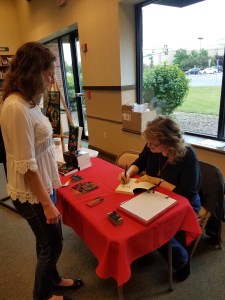 Welcome to Jilligan’s Island! Today we’re interviewing T.J. Akers, who stopped by on his blog tour to talk about The Final Paladin, which releases on November 14th. At the end of this interview, I’ll include the book blurb and some interesting information about T.J., as well as the Facebook party link. You’ll want to get your hands on this story. I started reading it last night and was immediately intrigued!
Welcome to Jilligan’s Island! Today we’re interviewing T.J. Akers, who stopped by on his blog tour to talk about The Final Paladin, which releases on November 14th. At the end of this interview, I’ll include the book blurb and some interesting information about T.J., as well as the Facebook party link. You’ll want to get your hands on this story. I started reading it last night and was immediately intrigued!
Hi, T.J.! We’re so excited to find out more about your new release, The Final Paladin. So, let’s jump right into the questions! Why do you write fiction?
TJ: I love creating stories, always have. My son was eight and an avid reader, and he should be, because I read to him every day until he turned seven. Then I read with him. He was losing interest in reading, and it concerned me. He complained about not having anything fun to read, so I got active in helping him find things. I introduced him to audio books and started pointing him to the good stuff. Then for his eighth birthday, I wrote him a novel. Of course, I also got him some cool presents, too. That was when I rediscovered writing, story creation, and everything else that goes with it. So I write because I love it. I also write so my readers will have fun, and in doing so, learn to love reading. If a reader did not have fun reading any fiction I wrote, I’ve failed.
JI: The Final Paladin starts in late 19th century, New York City. Why did you pick that time and place?
TJ: I’m a serious history geek, and as much as I enjoy science fiction and fantasy, I love history even more. Anyone that loves a good story understands the biggest and juiciest stories happened in real life. So why not incorporate the things I love the most in my stories? My favorite period of U.S. History takes place from the Civil War to the early twentieth century. Five Points, New York, is one of the most intriguing places to me in that time.
JI: Your book also incorporates urban fantasy and medieval lore. Do you love those things, too?
TJ: The short answer is yes, but there’s more to it. I went back to college in my 40s and discovered early British Literature. Thanks to a couple of very fine instructors, I discovered resources that went into greater detail about that period, the myths, and the tension of a quickly growing Catholic church and the existing pagan beliefs. Those tensions show up in the early literature (stories) of that time. I’ve read modern authors that use the same trope, but they’re inappropriate for younger readers. After reading Winter’s Tale by Mark Helprin and Jim Butcher’s Dresden series, I thought it was a shame that younger readers couldn’t have something fun along those same lines of urban fantasy.
JI: So you use the Paladin legend for your story. Why not King Arthur, or Templars, or Teutonic Knights?
TJ: I only use the legend as the basis, I don’t really use the original chivalric code because no one wrote it down in Charlemagne’s time. Historically, Charlemagne has the most evidence of the foundation of the concept of Chivalry and the Knightly Ideal. Again, the closest this got to being written is a story called The Song of Roland. Historically, chivalry is a French word from the 11th century, and it originally meant horsemanship. The church promoted chivalry as code because armed thugs rode around the country, killing people. The Catholic Church promoted the concept to try to bring peace and preserve human life. Chivalry, as we understand it, is technically a Christian ideal. So rather than use Templars, Teutons, or Arthur, I went back to the earliest of the European knights, Paladins.
JI: All that said, why even make it a part of The Final Paladin?
TJ: Originally, I wanted to start the series in ninth century Europe in Charlemagne’s empire with my character Godfrey, a Saxon whose village was swallowed up by Charlemagne’s conquests. I did my research, but I also wanted to enter the story in a contest offered by the American Christian Fiction Writers. Most of the judges are women and not speculative fiction fans. So in order to do better in the contest, I chose a female character and events that happened later in history.
JI: You wrote The Final Paladin to win a contest where the judges were predominantly female and probably non-speculative readers?
TJ: That’s essentially correct.
JI: Did your strategy pay off?
TJ: Yes and no, but what’s really cool is I got my fair share of male judges, and they scored my entry high. My manuscript made it to the final three, so it worked to a point.
JI: You didn’t win?
TJ: No.
JI: Well, we’re glad L2L2 picked it up! The story begins in Five Points, New York. But it doesn’t stay in New York City, does it?
TJ: That would be boring at this point, so the story goes to a place called Fairy, or the land of Fairies, elves, trolls, pixies, the White Stag, and everything else. I go back to all the legends and myths of western and central Europe, or at least the ones I could fit in.
JI: Is it a fairy tale retelling?
TJ: No, not exactly. I just mixed my mythologies: history and fairies. I also borrowed from the book of Revelation. There’s mention of a character named Apollyon, or in Hebrew, Abaddon, The Angel of Death. So I mixed in some Bible, knightly legends, and fairies and got a modern-day story in the tradition of Gawain and the Green Knight, or Beowulf.
JI: Is your novel written for adults?
TJ: I like to write for Young Adults and Middle Graders, but I’ve written for New Adults, too. I like those groups because you can still reclaim them as readers. I really write for speculative audiences. The one quality I love about speculative fiction readers is they’re reading for the story. You can make the protagonist eight, twenty, or ninety, and if the story is interesting, the reader won’t usually care.
JI: Are you planning on a whole series?
TJ: Yes. Michele Harper, my publisher wouldn’t have published me if I weren’t. I have in mind at least ten in the series, and that doesn’t even include the three or four prequels about Godfrey and how we even got to the 1870s with things in the state they are. All of that is going to depend on the novel’s popularity.
JI: Wow, that’s a big series!
TJ: Yeah, I have an overactive imagination.
JI: That’s a good thing for a writer to have. Do you write anything other than speculative fiction?
TJ: I have a contemporary YA novel that’s completed and edited. I nearly managed to get it published by Zondervan back in 2014. I also have ideas for historical fiction, too. There are four completed novel manuscripts on my computer: two are science fiction fantasy, a thriller, and a contemporary comedy. All that could easily be turned into a series. I have no shortage of stories tell.
JI: Is L2L2 interested in those?
TJ: Sure, but I have to run them by my publisher. They have to be good stories or she won’t publish them. I’m excited because my science fiction projects have male protagonists, and no one really publishes for boys anymore.
JI: Anything you want to add?
TJ: I’ve learned a lot since I started writing in 2004. Now I can go back to all the projects I’ve kept very shiny.
JI: Thanks so much, T.J., for joining us on the island!
Here’s a little more about The Final Paladin:
Life for Peg Bowman is rough in the infamous slums of Five Points, New York, but her brother’s murder changes everything.
Thrust into incredible worlds beyond any story she’s ever heard, Peg meets Sir Godfrey, an eleven-hundred-year-old knight from Charlemagne’s court, trainer of Paladins. He reveals to Peg her family’s ancient obligation to protect the Key of Apollyon, a relic of immense power. She is the last descendant of the Paladins and his only hope for keeping it safe.
When Godfrey confides her brother was murdered because of the Key, Peg rejects her calling and demands revenge, a luxury she can ill afford as otherworldly creatures seek her death to claim the Key’s power for themselves.
Can Godfrey and his faithful retinue—Chim the Hobgoblin, Rebecca the Jewish Maven and healer, and Jack the sometimes human and sometimes seven-foot Black Dog—keep her safe and convince her that her calling is worth pursuing? Or will she succumb to the Key’s lure and wield it for revenge?
And here’s a little more about T.J. :
T.J. Akers desires to be a multimillionaire when he grows up and give his wealth to his favorite causes: churches, schools, and animal shelters. Since the millions have been slow in coming, he’s settled for working as a computer technician for a state university and volunteering at his church and local animal shelter. Whenever possible, he indulges his love of writing stories to entertain people, especially younger readers.
Akers holds a Masters of English from Minnesota State University, Mankato, and can often be found roaming the university’s library, especially the children’s and young adult sections. Librarians have always been his heroes.
He lives with his beloved wife of thirty years, his dog, and two cats. The dog is an excellent writing companion, but the cats have proven to be rather critical. Learn more at www.tjakers.com
You can find him at the following social media sites:
Facebook: https://www.facebook.com/tj.akers.35
Twitter: https://twitter.com/TJAkers1
Google+: https://plus.google.com/101156763458205540263
Goodreads: https://www.goodreads.com/user/show/16679486-tj-akers
Pinterest: https://www.pinterest.com/akers0778/boards/
Don’t forget to stop by the Facebook Party on November 16!
 A blurb is like a dating profile. What can you tell the reader that will make him/her pick up the book? A fantastic cover helps, but an engaging blurb will make the reader buy it. List and name the main characters, what they want, and the obstacle in their way. Use exciting action verbs and hyperbole. Use words that create a certain feeling and will draw in the Ideal Reader of your genre– for example the sinister monk, or the ancient ruins. Oh, and DON’T tell the reader how it ends. Include the stakes. Will they find their way out of the labyrinthine rain forest? Will they be eaten by starved zombies? Will they kill the evil mastermind? What if they don’t? What? What?!?! After this is done, hone it down. Some contests call for a blurb under 200 words, but ideally it should be 100-150 words, so that it’s nicely spaced on the back cover. Plus you’ll need room for a tag line (more on that in part 2) and possibly information about you, the author!
A blurb is like a dating profile. What can you tell the reader that will make him/her pick up the book? A fantastic cover helps, but an engaging blurb will make the reader buy it. List and name the main characters, what they want, and the obstacle in their way. Use exciting action verbs and hyperbole. Use words that create a certain feeling and will draw in the Ideal Reader of your genre– for example the sinister monk, or the ancient ruins. Oh, and DON’T tell the reader how it ends. Include the stakes. Will they find their way out of the labyrinthine rain forest? Will they be eaten by starved zombies? Will they kill the evil mastermind? What if they don’t? What? What?!?! After this is done, hone it down. Some contests call for a blurb under 200 words, but ideally it should be 100-150 words, so that it’s nicely spaced on the back cover. Plus you’ll need room for a tag line (more on that in part 2) and possibly information about you, the author! A synopsis is a one-to-two page document. Here’s where the publisher looks for plotting issues or weird tropes (i.e., it was all a dream!), but isn’t expecting advertising copy. Keep it minimal — usually either one page (single spaced) or two pages (double spaced). Check the editor/publisher/agent guidelines. If it doesn’t specify, don’t sweat it. Just pick one. Write it in the same tone and style the book is written in. One caveat: if your book is written in first person, don’t write your synopsis that way. Typically, write it in active voice, third person, present tense.
A synopsis is a one-to-two page document. Here’s where the publisher looks for plotting issues or weird tropes (i.e., it was all a dream!), but isn’t expecting advertising copy. Keep it minimal — usually either one page (single spaced) or two pages (double spaced). Check the editor/publisher/agent guidelines. If it doesn’t specify, don’t sweat it. Just pick one. Write it in the same tone and style the book is written in. One caveat: if your book is written in first person, don’t write your synopsis that way. Typically, write it in active voice, third person, present tense.
 Hi all! I was tagged by the lovely
Hi all! I was tagged by the lovely 
 Recently, a friend posted about a signing she was having and asked how to set up her table. So I should thank her for inspiring this post (thanks, Laurie!)
Recently, a friend posted about a signing she was having and asked how to set up her table. So I should thank her for inspiring this post (thanks, Laurie!) A poster with your beautiful book cover because, well, just look at it! Why wouldn’t you want it in a larger format? This visual may be all that’s needed to garner another sale–because even though we shouldn’t, many do judge a book by its cover and choose to buy only on this point alone.
A poster with your beautiful book cover because, well, just look at it! Why wouldn’t you want it in a larger format? This visual may be all that’s needed to garner another sale–because even though we shouldn’t, many do judge a book by its cover and choose to buy only on this point alone. Dear younger me
Dear younger me
 Dear younger me
Dear younger me Welcome to Jilligan’s Island! Today we’re interviewing T.J. Akers, who stopped by on his blog tour to talk about The Final Paladin, which releases on November 14th. At the end of this interview, I’ll include the book blurb and some interesting information about T.J., as well as the Facebook party link. You’ll want to get your hands on this story. I started reading it last night and was immediately intrigued!
Welcome to Jilligan’s Island! Today we’re interviewing T.J. Akers, who stopped by on his blog tour to talk about The Final Paladin, which releases on November 14th. At the end of this interview, I’ll include the book blurb and some interesting information about T.J., as well as the Facebook party link. You’ll want to get your hands on this story. I started reading it last night and was immediately intrigued!
 At the doctor’s office recently, I met another writer. We shared the what-do-you-write pleasantries before she shook her head. “I’ve been doing this for three years. How long did your first novel take?”
At the doctor’s office recently, I met another writer. We shared the what-do-you-write pleasantries before she shook her head. “I’ve been doing this for three years. How long did your first novel take?” yourself, go ahead. But I prefer to have Someone bigger lead my writing career and support group.
yourself, go ahead. But I prefer to have Someone bigger lead my writing career and support group. Today on Jilligan’s Island, we (that’s the royal “we”) are interviewing author Kristen Stieffel. We’re talking writing and books, but most specifically her novel, Alara’s Call which releases this Tuesday (the 19th). It’s a fantastic read.
Today on Jilligan’s Island, we (that’s the royal “we”) are interviewing author Kristen Stieffel. We’re talking writing and books, but most specifically her novel, Alara’s Call which releases this Tuesday (the 19th). It’s a fantastic read.


 On my way back home, I cut through a wooded area. It’s been cleaned up, so there’s no underbrush, just spongy moss, some early fallen leaves, and wild chicory underfoot. A flash of white caught my eye. It was a daisy, petal perfect with a sunny yellow center. It was alone among the toadstools that show up every fall. I couldn’t resist picking it, then looking for its brothers or sisters. Finally, I saw a handful clustered around a big tree. These few daisies were late bloomers. Like me.
On my way back home, I cut through a wooded area. It’s been cleaned up, so there’s no underbrush, just spongy moss, some early fallen leaves, and wild chicory underfoot. A flash of white caught my eye. It was a daisy, petal perfect with a sunny yellow center. It was alone among the toadstools that show up every fall. I couldn’t resist picking it, then looking for its brothers or sisters. Finally, I saw a handful clustered around a big tree. These few daisies were late bloomers. Like me.